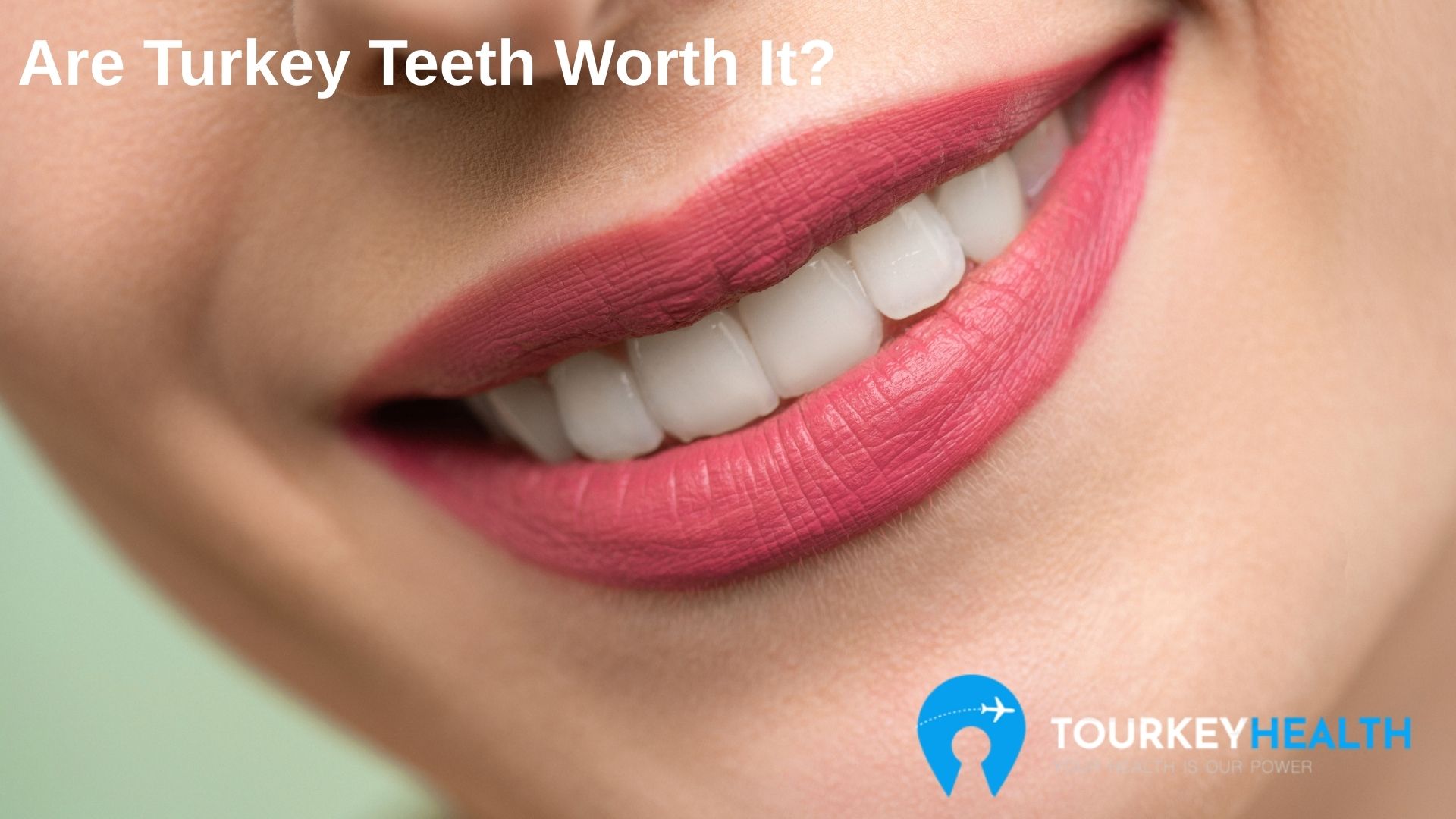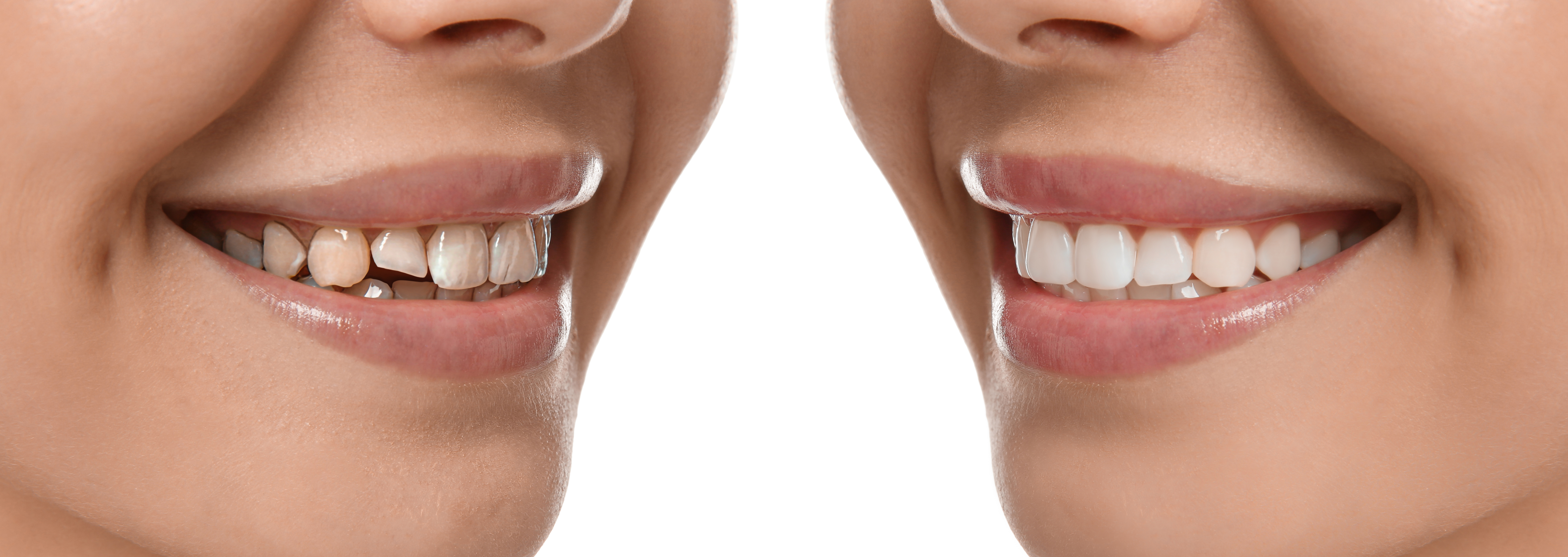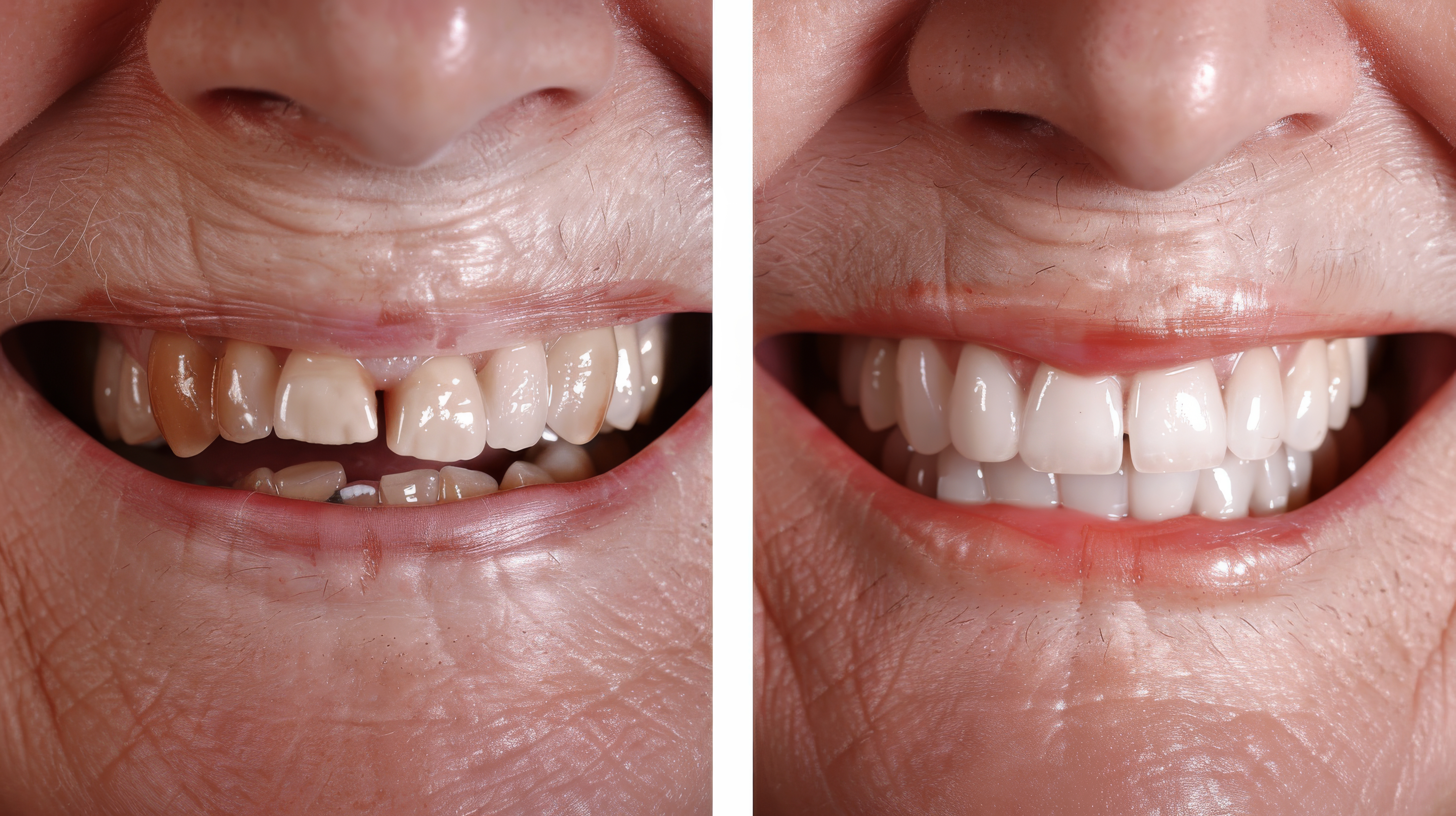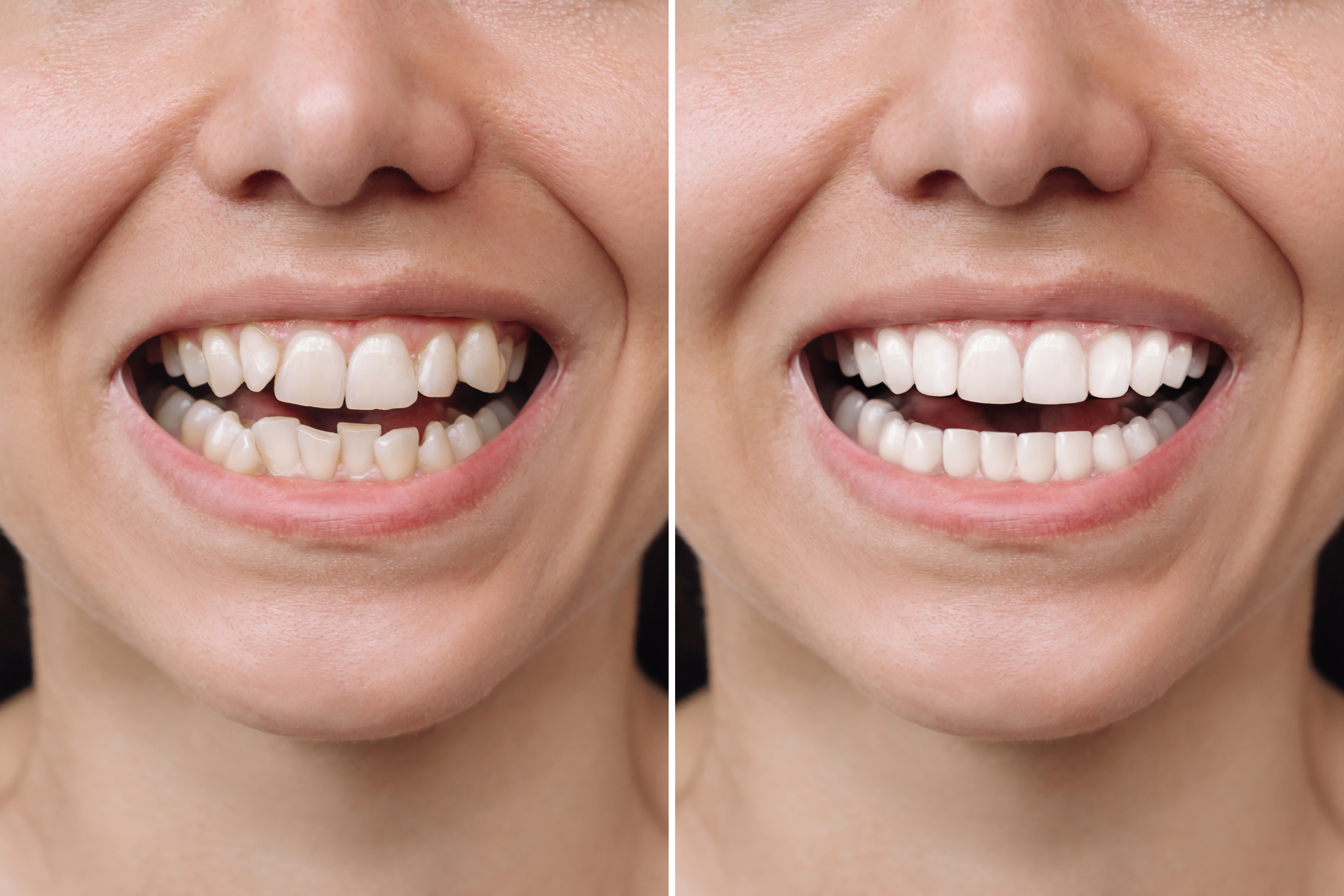
What are Turkey teeth?
“Turkey teeth” is a nickname people use online. It usually means very white, straight teeth, done fast and often in Turkey. Most of the time, these are crowns or veneers.
Why Turkey? The cost of treatments is significantly lower in Turkey compared to the UK, US, or Europe. And clinics offer full packages: hotel, transfers, and treatment, all in one. That's why many people fly in for a quick smile makeover in Turkey.
But here's the catch: not all results are the same. Some clinics do amazing work. Others may shave teeth too much or skip proper exams. That's where problems start. So “Turkey teeth” can look great.
Bottom line? You can reach the perfect aesthetic look, but only if done safely and by skilled dentists.
Turkey teeth process
Getting your teeth done in Turkey is pretty simple. Here's how it usually goes, step by step:
1. First contact
You talk to the clinic online. You send photos of your teeth. They tell you what treatment you need, like veneers or crowns.
2. Travel and first visit
You go to Turkey. The clinic picks you up. You meet the dentist, and they check your teeth again to be sure.
3. Tooth shaping
If you get crowns, they gently shape your real teeth. Don't worry! You get numbing, so it doesn't hurt.
4. Temporary teeth
They place temporary teeth in your mouth while your new ones are made. You can smile, eat, and talk like normal.
5. Final teeth
Your real teeth are ready in a few days. You go back to the clinic. The dentist fits them and makes sure they feel and look right.
6. You're done
Once everything is perfect, they glue them in place. You leave with a new smile.
The whole thing usually takes 5 to 7 days. Many clinics also help with hotels and rides. Easy, fast, and if you choose a good clinic, very safe too.
What is the difference between veneers and crowns?
|
Veneers |
Crowns |
|
Front surface only |
Entire tooth |
|
Thin |
Thicker |
|
Minimal shaving |
More reshaping needed |
|
Cosmetic fix |
Repair + protect |
|
Mostly healthy teeth |
Damaged or weak teeth |
|
Less strong |
Stronger |
|
Porcelain or composite |
Porcelain, metal, or both |
|
For color/shape fixes |
For cracks, decay, large fill-ings |
Veneers are like thin covers. Dentists stick them to the front of your teeth. That's it. They're great if your teeth are mostly fine but maybe a bit stained, chipped, or uneven.
Crowns are more like a cap. They go all around the tooth-front, back, top, and sides. If your tooth is weak, broken, or has a big filling, a crown gives it strength and shape again.
So, what's the big difference?
Veneers = small changes, just on the front.
Crowns = full cover, more protection.
Still unsure? Think of it like this:
Want a smile upgrade, but your teeth are healthy? Go with veneers.
Need strength and repair, too? A crown is better.
Always ask your dentist. They'll know what suits your teeth best.
Is it safe to have dental treatments in Turkey?
Yes, it is! Turkey has a solid healthcare system and strict rules for dental clinics. Dentists go through years of training, and many follow international standards. Most clinics are inspected often and use the same tools and materials you'd find in the UK or US.
Worried about hygiene? Don't be. Reputable clinics in cities like Antalya or Istanbul are spotless.
One small tip? Always check reviews and make sure your dentist is registered with the Turkish Dental Association.
Safe and clean care, just with a better view and a better price. Sounds good, right?
Why are Turkish dental treatments less expensive than in the US and Europe?
It's not because quality is lower. It's mostly about lower costs.
Dentists in Turkey don't pay as much for rent, staff, or insurance. That cuts a big chunk off the final price. Also, the Turkish lira is weaker than the euro or dollar. So, when you pay in foreign currency, your money goes further.
Another reason? No middlemen. Many clinics handle everything in-house, from 3D scans to lab work. That means no extra costs added on.
Plus, the government supports health tourism. That helps clinics stay competitive.
Bottom line? You get top-level treatment without paying top-level prices. That's why people fly in smiling and fly out smiling wider.
How long do quality dental implants last in Turkey?
Good dental implants can last 20 years or more. Some people can use them for life.
But it depends on you too. If you take care of them (brushing, flossing, and seeing your dentist), they last longer. If you smoke or don't clean well, they don't last that long.
In Turkey, clinics use strong materials and modern tools, so the success rate is high. But still, daily care is the key.
Think of it like this: the implant is strong, but the gum around it needs care. Healthy gums = long-lasting implant.
How long do quality Turkish veneers last?
Most Turkish veneers last around 10 to 15 years. Sometimes even more.
But it depends on you. If you brush your teeth, don't bite hard stuff, and visit your dentist now and then, they will last longer.
If you grind your teeth or don't care much, they wear out faster.
Is there any risk of Turkey teeth?
Some people go for super cheap options. That's where trouble starts. Over-filed teeth, bad-fitting veneers, pain, or even infections. But this story isn't about Turkey. It's about poor dentists.
But what about when you choose a reputable clinic with good reviews and real dentists?
You're fine. Most patients are actually super happy with their results.
Just do your homework. Ask for before-and-after photos. Make sure the dentist speaks your language. If they rush you, walk away.
Good teeth are not just about the price; they're about the hands that do the work.
How to choose the best Turkish dental clinic?
Don't just follow the Instagram ads.
If you're planning dental work in Turkey, picking the right clinic is everything. A great price doesn't mean great care. So, here's how to avoid regrets and land in safe, skilled hands:
1. Start with reviews.
Real ones. On Google, Trustpilot, or WhatClinic. Look for reviews with photos and details, not just “they were great.” That tells you nothing.
2. Check dentist credentials.
Are they licensed? Do they have experience in your procedure? Many top Turkish dentists speak English; that's a plus for clear communication.
3. Ask for before and after photos.
Good clinics are proud to show their work. If they dodge the question, walk away.
4. Transparency is key.
They should explain every step from the procedure to the cost. If the price keeps changing or details feel fuzzy? That's a red flag.
5. Look beyond the website.
A pretty website doesn't mean good dentistry. Ask questions. Set up a video consult. See how they treat you before you even book.
6. Do they offer follow-up care?
What if you have a problem after the treatment? Reputable clinics include follow-ups or help connect you to a local dentist back home.
7. Trust your gut.
If something feels off—too rushed, too pushy, or too cheap—trust that feeling.
What is the cost of Turkey teeth?
Full sets of “Turkey teeth” (usually 20 zirconium veneers) cost around $3,500-$5,500 USD in Turkey.
Now compare that to the US or UK, where the same thing can easily hit $20,000-$30,000. Yes, really.
So, why is Turkey so much more affordable?
Lower operating costs (clinic rent, lab fees, and staff salaries are cheaper)
No waiting lists (you can start treatment the day you land)
Dental tourism packages (they include hotel, transport, translator, and all-in-one checkups)
No middlemen (you deal directly with clinics, not chains or brokers)
Currency difference (strong dollar/pound vs. Turkish lira means big savings for visitors)
Is cheaper lower quality? Not at all, as long as you choose a legit, well-reviewed clinic. Many Turkish dentists train in Europe and use top materials like Emax or zirconium.
Turkey teeth before and after



FAQs
How long do Turkey teeth last?
Turkey teeth (like zirconium or Emax veneers) usually last 15 to 20 years, sometimes even longer with good care.
Brushing, flossing, and avoiding super hard foods help them last.
No smoking and regular dentist visits? This is better.
Turkey teeth gone wrong?
Sometimes things don't go as planned. If the clinic uses poor materials, or the dentist shaves too much enamel, problems can show up fast, like tooth sensitivity, pain, or even infections.
But here's the key: Most of these issues happen in cheap, low-quality clinics. That's why it's so important to choose the right place. Quality care almost always means safer, better results.
Is it worth getting teeth done in Turkey?
Yes, if you do your homework.
You can get top-quality treatment for way less than in the US or UK. Many clinics offer full packages: treatment, hotel, and even airport pickup. Plus, no long waiting lists.
But don't just chase the lowest price. Look for experienced dentists, strong reviews, and proper certifications. When done right, it's totally worth it, both for your smile and your wallet.
Can you trust a dentist in Turkey?
Yes, many are highly trained and trustworthy.
Turkey has strict rules for clinics and dentists. Many professionals study in top universities and follow international standards. You'll also find clinics using the latest tech and tools.
But here's the key: do your research. Look at real patient reviews. Check before-and-after photos. Make sure the clinic is licensed and the dentist is experienced.
When you choose the right clinic, yes, you absolutely can trust a dentist in Turkey.
Click here for more FAQs